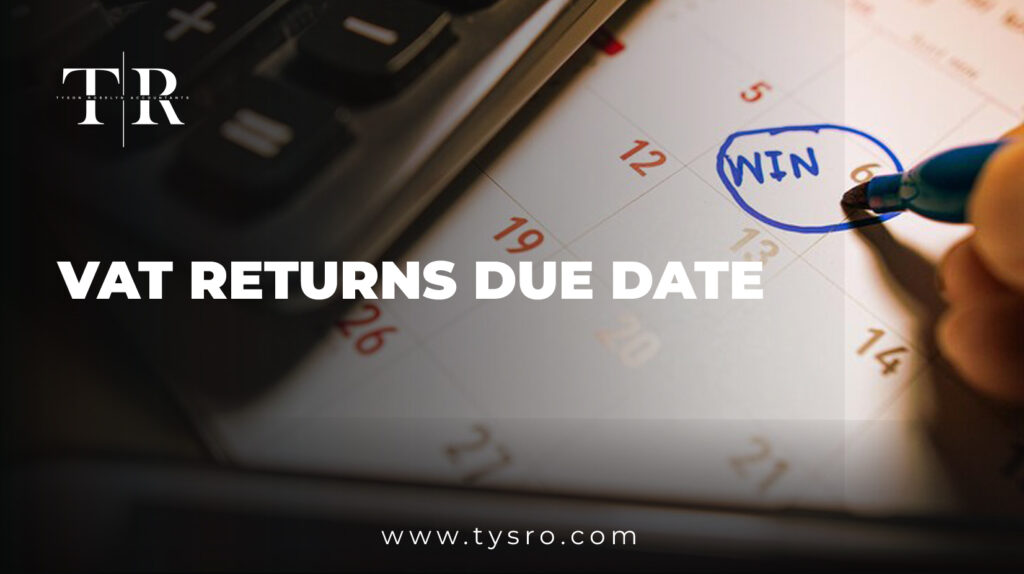Introduction
When running a business in the UK, keeping track of your VAT Returns Due Date is essential. Missing a deadline can lead to penalties and complications with your finances. This article will provide a comprehensive guide on VAT returns, helping you understand the process, due dates, and how to stay on top of your obligations.
What is VAT?
VAT, or Value Added Tax, is a tax applied to most goods and services sold in the UK. It’s a consumption tax, which means that the end consumer pays it, but businesses are responsible for collecting and submitting it to HM Revenue and Customs (HMRC).
Why is VAT Important?
Understanding VAT is crucial for businesses, especially if your taxable turnover exceeds the VAT registration threshold, which is currently £85,000. If your business is registered for VAT, you must charge VAT on your sales and can reclaim VAT on your purchases.
VAT Returns: An Overview
A VAT Returns Due Date is a document that businesses submit to HMRC, summarizing the VAT you’ve charged on your sales and the VAT you’ve paid on your purchases. It allows HMRC to determine how much VAT you owe or can reclaim.
Typically, VAT returns are submitted quarterly, although some businesses may opt for annual returns.
The Process of Submitting VAT Returns
- Register for VAT: If your business meets the VAT threshold, you must register for VAT with HMRC. This process can be done online through the HMRC website.
- Maintain Accurate Records: Keep detailed records of all your sales and purchases, including invoices and receipts. This will make it easier to complete your VAT return.
- Complete Your VAT Return: You can complete your VAT return online using HMRC’s online services. Make sure to include all the necessary information, including your total sales, total purchases, and the VAT you owe or can reclaim.
- Submit Your VAT Return: Once your return is completed, submit it through the HMRC online system.
- Pay Your VAT Bill: If you owe VAT, ensure that you pay it by the due date to avoid any penalties.
VAT Returns Due Dates
VAT returns are typically due one month and seven days after the end of your VAT period. For example, if your VAT period ends on March 31, your VAT return would be due by May 7.
Important VAT Returns Due Date for 2024
- January 31, 2024: Deadline for VAT returns for the period ending December 31, 2023.
- April 30, 2024: Deadline for VAT returns for the period ending March 31, 2024.
- July 31, 2024: Deadline for VAT returns for the period ending June 30, 2024.
Note: These dates can vary based on your specific VAT period and whether you’re on a standard or annual VAT return scheme.
Consequences of Missing VAT Due Dates
Failing to submit your VAT return by the due date can lead to penalties and interest on the amount owed. The penalties can increase if you continue to miss deadlines, which can strain your finances.
Anecdote: A Costly Mistake
Consider the story of a small business owner, Sarah, who runs a café in London. In her first year of business, she overlooked her VAT return deadline. She thought she had a few extra days to submit her return. Unfortunately, she received a hefty fine from HMRC, which impacted her cash flow and forced her to tighten her budget. Sarah learned the hard way that keeping track of VAT due dates is crucial for maintaining a healthy business.
Tips for Staying on Top of VAT Returns
- Set Reminders: Use a calendar or reminder app to alert you a few weeks before your VAT return is due.
- Automate Bookkeeping: Consider using accounting software that can help you track your VAT records and even remind you of upcoming deadlines.
- Hire a Professional: If managing VAT seems overwhelming, consider hiring an accountant or using professional services like tysro.com to help with your VAT returns. Their expertise can ensure compliance and accuracy.
- Stay Informed: Regularly check the HMRC website for updates on VAT regulations and deadlines.
Conclusion
Managing your VAT returns due date is vital for the success of your business. By staying organized and aware of deadlines, you can avoid costly penalties and keep your finances on track.
If you’re looking for professional assistance with your VAT returns or accounting needs, consider the services offered by Tysro. Their expertise can help you navigate the complexities of VAT and ensure your business stays compliant with HMRC.


